It is the biggest council housing landlord in London and the fourth largest in the country. With 39,000 rented and 16,700 leasehold homes, a 19,000-strong waiting list and almost 15,000 properties needing repair ( “non-decent”, 2010 figures) the scale of Southwark council’s housing challenge demands a radical response. Housing barrister Jan Luba is to chair a pioneering study into housing need and policy – but will the council listen to it? Read my the rest of my piece on the Guardian website here.
All posts by Saba Salman
The truth about rough sleeping
The Truth About Stanley trailer from www.thetruthaboutstanley.com on Vimeo.
Think homelessness and film and you can’t fail but think of Cathy Come Home. While the social action that followed Ken Loach’s cinematic call to arms was a one-off, the film project The Truth About Stanley could be a modern take on that artistic tradition; a visually striking and thought-provoking piece of social realism that seeks to raise not only awareness about homelessness, but funding.
Just today the government’s new homelessness figures showed 48,510 households were classed as homeless in 2011, a 14% rise on 2010. The situation has led one charity chief executive, Leslie Morphy, of Crisis, to demand action from the government amid the “perfect storm” – a combination of economic downturn, joblessness, soaring demand for affordable housing, housing benefit reform and cuts to homelessness services.
This is the dire social and economic backdrop to the forthcoming film shot by award-winning director Lucy Tcherniak. The Truth About Stanley tells the story of two rough sleepers who make unlikely friends; Stanley, an elderly Congelese man, and Sam, 10.

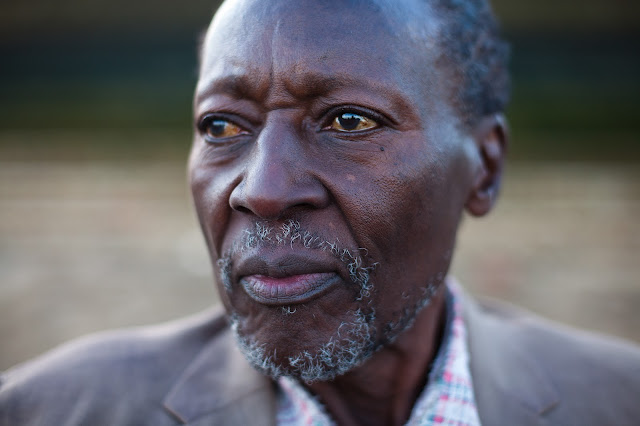
The non-linear narrative is intriguing, opening as it does with the death of Stanley and developing into questions about Stanley’s past and the reasons for Sam being on the streets.

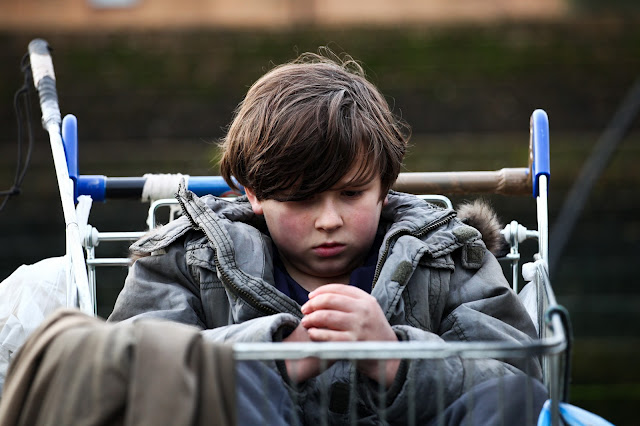
The lines between reality and fiction are blurred as the pair’s friendship develops and Stanley regales his young runaway companion with stories from his past. Or, as the website neatly puts it: “No home, no belongings, plenty of baggage. A short film about a man, his stories and the boy who listened.”
The project, a twist on more traditional donation campaigns, aims to raise money for two homelessness organisations, social enterprise The Big Issue Foundation and charity Anchor House.
The film offers a much-needed focus on the twin issues of older and younger rough sleepers. Entrenched rough sleeping is common among older rough sleepers but accurate figures on the issue and that of homelessness among older people are hard to come by, partly because of the hidden homelessness and the lack of age breakdown in head counts.
According to Homeless Link, however, the 2010 total of street counts in authorities with a known or suspected rough sleeping problem was 440 and generally around 18% are over 50-years-old.
As for children sleeping rough, again the figures lack accuracy, but according to the charity Railway Children, at least 100,000 children runaway in the UK every year and many are not reported as missing by their parents or carers. According to youth homelessness charity Centrepoint, 80,000 young people experience homeless in the UK each year.
The 20-minute film is being produced in association with Oscar-winning Trademark Films and features songs by Radiohead and Mumford and Sons. Stanley is played by renowened Kenyan actor Oliver Litondo, the lead from the international feature film The First Grader and Sam by 12-year-old Raif Clarke. This Guardian piece from last year tells you a bit more.
The trailer and shots here (photographs by Ben Millar Cole) have been released ahead of the premiere on April 2 at the Rich Mix cinema in Shoreditch. The film will be and released online on April 4th.
*To donate text STANLEY2, 3 or 6 to 70300 to give £2, £3 OR £6 to The Truth About Stanley fund or visit the project’s
Just Giving page.
100% of the donation will go to homeless charities Anchor House and The Big Issue Foundation. Follow the film on Twitter.
Stephen Greenhalgh: localism hero or demolition man?
Stephen Greenhalgh is hated and feted. To Labour, he is a tyrant for keeping council tax low at the expense of frontline services in the west London borough he has led since 2006. To the Conservatives, he is a town hall trailblazer, praised by the communities and local government secretary, Eric Pickles, who describes Hammersmith & Fulham council as “the apple of my eye”.
Greenhalgh has perhaps baffled both parties by announcing he is to quit the leadership for the council backbenches in order to help steer a pilot community budget in White City, a deprived area of the borough. Rumour had him in line for a peerage. Read the rest of my interview with Stephen Greenhalgh in the Guardian’s Society pages.
Painting, prisons and penal reform
Some thoughtful and attention-grabbing images on display this week at The Big Issues exhibition, a project that forms part of prison outreach work at Surrey’s recently restored Watts Gallery.

The exhibition is the result of the Compton-based gallery’s Art for All project. The outreach scheme involves artist-led workshops with inmates in prisons including Send and Coldingly in Surrey and Bronzefield in Middlesex – the pieces featured here are by female offenders at Send and Bronzefield.

The inclusive arts project is in keeping with the beliefs of the gallery’s namesake, Victorian artist George Frederic Watts. Watts and his artist wife Mary Watts supported penal and social reform, believing in widening access to art, using the medium to benefit individuals and the community and arguing against prejudice towards ex-offenders. The couple’s aim of transforming lives through encouraging the socially excluded to engage with art underlines the gallery’s current outreach work.

Art for All aims to build confidence and self-worth in people usually deemed socially excluded – prisoners, young offenders, addicts, and those with mental health issues or experiencing homelessness housing. One former prisoner at HMP Send, for example, was released before Christmas and been accepted on a foundation course at Brighton University. Another participant described the project as “some light in the dull, grey prison world”.
Rehabilitation through art can provoke controversy and the Watts gallery scheme is by no means unique, but with prison numbers at a record high and a proven reoffending rate of 26%, the value of projects like this is clear.
12 days of Christmas, Social Issue-style
Season’s greetings from The Social Issue – to mark the jollities, here’s a snapshot of some of the upbeat posts and pictures about people, projects and places featured over the last 12 months. This festive pick is by no means the best of the bunch – the inspiring stories below are included as they’re accompanied by some interestin and images and almost fit with a festive carol, if you allow for a little the poetic and numerical licence…
Very huge thanks to the Social Issue’s small band of regular and guest bloggers, all contributors, supporters, readers and everyone who’s got in touch with story ideas and feedback. See you in January.
On the first day of Christmas, the blogosphere brought to me:
A tiger in an art show

Two JCBs

Three fab grans

Four working teens

Five(ish) eco tips
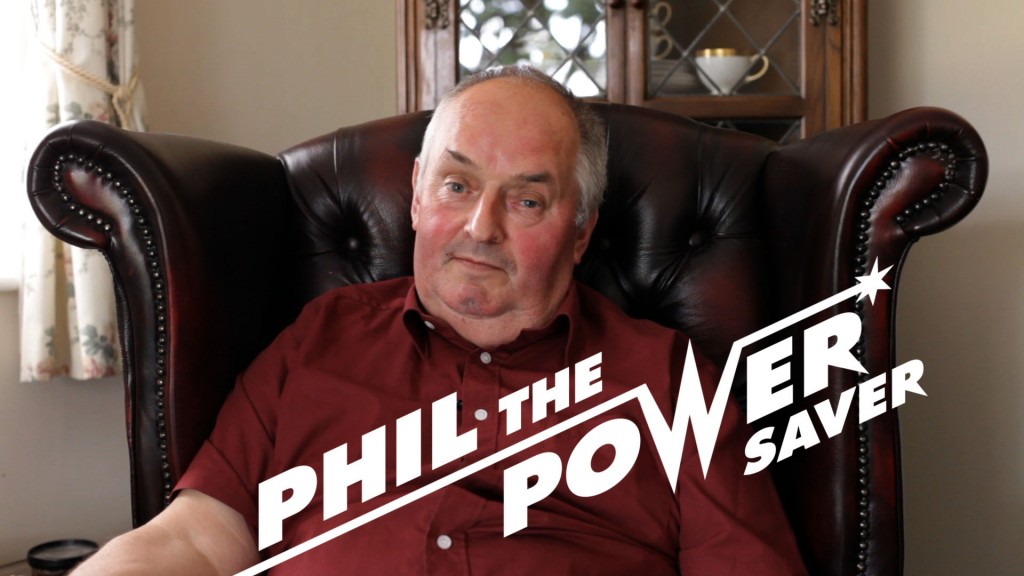
Six(ty) volunteers

Seven(teen) pairs of wellies

Eight(een-years-old and over) people campaigning

1950s hall revamping
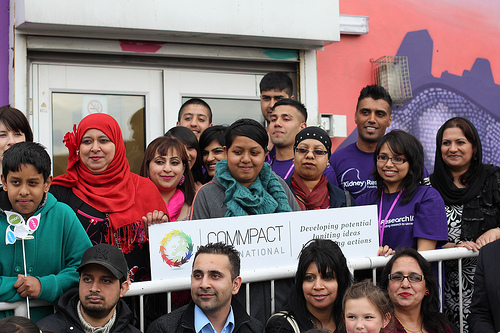
11-year-olds integrating

12(+) painters painting

Merry Christmas and Happy New Year!
More recognition for the role of carers
Janet Down only realised she was a full-time carer for her disabled husband when she fell ill a few years ago and could not look after him. Suffering back pain from lifting and depression from coping unsupported, her inability to care for 65-year-old Dave exposed just how much she did for him. This prompted her to recognise her role, accept she needed help and find leaflets about caring at her library.
Carer aware, an innovative project that Down subsequently participated in and designed by Dudley borough council, is making it easier for carers like Down to get support. The online mini-training toolkit offers an explanation of carers’ rights, better access to support and reassurance that professionals are recognising carers’ issues. Down now champions the scheme as chair of Dudley Carers Forum. “Knowing how and what the carer is entitled to receive is empowering,” she says. Read the full piece here on the Guardian Social Care Network.
Decent homes for the homeless
“Homelessness doesn’t have a face,” says Janet Marsh, “it can happen to anyone, anywhere.” Marsh, 65, from east London, lost her privately rented home in her 50s after her marriage ended, then became ill with epilepsy and arthritis. “People think homelessness is something you’ve done to yourself, there’s stigma and misconception,” she says.
Though Marsh is now living in temporary accommodation in Newham, her housing situation could not contrast more with the popular image of a tenure defined by shoddy, unregulated properties and unscrupulous private landlords. Marsh is a tenant of Local Space, an innovative housing association that uses private finance to buy homes on the open market, refurbishes the properties and leases them back to the council as temporary accommodation. Read the rest of my piece on the Guardian’s housing network.
“Care is about people, it’s not just a process”
Last Christmas was the first time in 14 years that Alex (not his real name) had spent the season with his family. It was the first time his parents had come to his house for Christmas dinner, the first time the 46-year-old had shopped for the meal, prepared it, laid the table and chosen the wine.
The event would have been inconceivable just a year before when, Alex, who has a severe learning disability, was living in a care home in Kent. He had already spent many years in a long-stay hospital ward. His challenging behaviour ranged from kicking to spitting and usually resulted in him being restrained by four members of staff, one pinning down each of his limbs, for up to 45 minutes.
Alex’s story, which outlines his path to appropriate social care, is among the powerful testimonies published in a report today by the Voluntary Organisations Disability Group (VODG). I was involved in producing the report for the VODG, which brings together more than 50 voluntary sector disability organisations, and I also manage the group’s blog.
Another Way: transforming people’s lives through good practice in social care, is a response to the Winterbourne View scandal earlier this year which involved the abuse of people with complex learning disabilities at a care unit in Bristol.
Gavin Harding, who co-chairs the National Forum for People with Learning Disabilities and chairs self-help advocacy group Voices for People, writes in the foreword to the publication: “There is another way, which is presented in this report. It’s about putting people with learning disabilities and their families at the centre of planning and delivery of care.” Harding adds: “Care is about people, it’s not just a process.”
The VODG report outlines the key elements that can contribute to high quality, cost-effective care.
You can read more about the report via this blogpost.
A fight for the rights of students with long-term illness
Last year Ian Leech, who lost his student daughter to non-Hodgkin’s lymphoma, successfully campaigned for financial support for students whose treatment for illnesses such as cancer forced them to interrupt their studies. As a result of his work, young people no longer have to use student loans for support in such situations. In this guest post, he describes what happened – and why his campaign is far from over.
By Ian Leech
In 2007, having been diagnosed at the age of 20 with non-Hodgkin’s lymphoma, my daughter Melissa decided to suspend her university studies for a year to recover from this life changing illness and concentrate on getting well. It was a huge decision for Mel; she loved university and embraced all that university life had to offer (see this earlier post for Mel’s story).
The original prognosis was positive. Six rounds of chemotherapy three weeks apart, maybe some radiotherapy and it would, in the words of the consultant, just be a bad memory. It doesn’t take a mathematician to work out that treatment would last probably around 20 weeks. In that time Mel would endure extreme tiredness, confusion, have breathing difficulties, mouth ulcers and all that on top of the psychological aspect of being told that at 20 years of age, you have cancer.
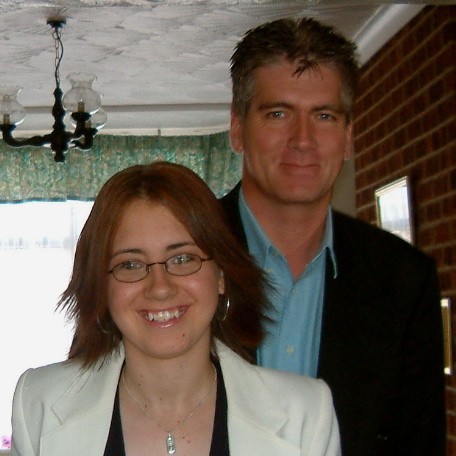
Having made the decision to suspend her studies, she applied for financial support. She hadn’t drawn on her student loan and had no savings. The response from the government was that she should either suspend her studies or use her student loan.
I wrote to my MP explaining the psychological effects of her having to abandon her studies and explained that I was under the impression a student loan was to support study and not act as a health insurance.
So began a battle with first, the Labour government and latterly the Conservatives to bring about a change in the law. It was nearly six months before Melissa received any financial support. Three months later she sadly passed away. I wanted to ensure that any student suspending their studies to recover from long term illness would receive immediate financial support.
As more emails arrived from parents and students relating similar stories, I continued the fight after Mel’s death. Eventually, the government listened and on November 1st 2010 the deeming rule was changed. Students were no longer assumed to have drawn on their student loan when suspending their studies. Therefore they could now apply for Employment Support Allowance (ESA). Victory for the little man!
As usual though, the government officials making the decisions had not thought the change through and they failed to remove the long-standing clause that to qualify for ESA, a student must be in receipt of Disability Living Allowance. This meant that the majority of students, when suspending their studies to recover from a long term illness still would not receive any financial support.
It is incredible that in this day and age our government treat people in this way. Mel never wanted hundreds of pounds, just a few quid to enable her to buy a bar of chocolate or other every day items without having to ask mum and dad. She wanted just enough to give her a bit of self-respect during a horrible time.
In my last letter to the Department of Work and Pensions (DWP) I asked Sir Iain Duncan Smith how a student in Melissa’s position was supposed to live. The answer I received from the DWP was that people in Melissa’s situation are a minority and therefore they would do nothing more.
I wrote to David Cameron back in 2007 when he was in opposition. His reply, which I still have, stated that “the Conservative Party are committed to helping the most vulnerable in society”. How times change! Power really does change people!
My battle with the government continues. There are other avenues I am exploring to resolve this. Camping outside St. Paul’s Cathedral isn’t one of them, well, not yet! I still receive emails from parents and students who are experiencing similar problems. In order to receive DLA, you have to have had the condition for three months and it needs to be ongoing for a further six months.
One lady told me how her 20-year-old daughter, diagnosed with cancer, was told she wouldn’t receive DLA because her chemotherapy finished in four months and therefore her condition didn’t meet the six month criteria required for receiving it. It is unbelievable that those making decisions on financial support for seriously ill people think that a cancer patient’s illness ends when the last drop of chemotherapy goes through the veins.
The important matter in all of this is that when a student finds themselves in the position that Melissa did and decides to suspend their studies, they have access to financial support and they don’t have to wait nearly six months for financial support.
I recently received a letter from a lady who had been trying for nearly 12 months to get support for her daughter. Sadly, earlier this year the family were told her condition was incurable. The financial support quite rightly came flooding in, but as she said, “it’s a shame you have to be dying to get the help you needed in the beginning”.
I am all for getting rid of the cheats and scroungers that play the system, but whilst doing that, the government must not lose sight of why the welfare system was originally put in place, to look after those in need, or as David Cameron put it whilst leader of the opposition, in a letter to me in 2009, “to help the most vulnerable in society”
The fight goes on.
* You can read more about Ian’s work and campaigning on his website Mad4Mel. For information about lymphoma visit the Lymphoma Association website.
Neets: “Unemployment knocked my self-esteem..I wasn’t good enough at anything.”
William Wright left his Somerset school with a handful of GCSEs. Confused about what to do after school, he felt his teachers had “given up” on him. Wright found temporary work as a plasterer but lacked the qualifications for a permanent job. Unemployed and uncertain, he fell into a vicious circle; being jobless destroyed his confidence and made him feel depressed, which made it difficult to find work. Now 26, he says: “I felt like a failure. Unemployment knocked my self-esteem and made me feel like I wasn’t good enough at anything.”
One million 16- to 24-year-olds in the UK are not in education, employment or training, just as William was. Read more here in my piece from the Guardian on Saturday.
And in the same youth supplement this piece by Kate Murray, who also blogs on this site, explores how to restore young people’s faith and involvement in politics with comments from MPs – including children’s minister, Tim Loughton – youth workers and community activists.
